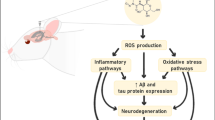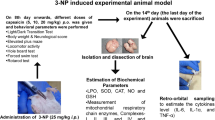Abstract
Manganese (Mn) is an essential metal for many functions in the body. However, in excess, it can be neurotoxic and cause a Parkinson-like syndrome, known as manganism. Here, we aimed to identify a protective effect of probucol, a lipid-lowering agent with anti-inflammatory and antioxidant properties, against Mn-induced toxicity in human neuroblastoma (SH-SY5Y) and glioblastoma (C6) cell lines. The cells were incubated with increasing concentrations of Mn followed by probucol addition 1, 3, 6, and/or 24 h to assess the metal toxic doses and measure the protective effect of probucol against Mn-induced oxidative damage. Longer exposition to Mn showed decreased SH-SY5Y cellular viability in concentrations higher than 100 µM, and probucol was able to prevent this effect. The C6 cells were more sensitive to the Mn deleterious actions, decreasing the cell viability after 6 h of 500 µM Mn exposure. In addition, probucol prevents the complex I and II of the mitochondrial respiratory chain (MRC) inhibition caused by Mn and decreased the intracellular ROS production. Taken together, our results showed that Mn toxicity affects differently both cell lines and probucol has a protective effect against the oxidative imbalance in the central nervous system.





Similar content being viewed by others
References
Alaimo A, Gorojod RM, Kotler ML (2011) The extrinsic and intrinsic apoptotic pathways are involved in manganese toxicity in rat astrocytoma C6 cells. Neurochem Int 59:297–308. https://doi.org/10.1016/j.neuint.2011.06.001
Ali SF, LeBel CP, Bondy SC (1992) Reactive oxygen species formation as a biomarker of methylmercury and trimethyltin neurotoxicity. Neurotoxicology 13:637–648
Aschner M, Erikson KM, Hernández EH, Tjalkens R (2009) Manganese and its role in Parkinson’s disease: from transport to neuropathology. NeuroMolecular Med 11:252–266. https://doi.org/10.1007/s12017-009-8083-0
Aschner M, Gannon M, Kimelberg HK (1992) Manganese uptake and efflux in cultured rat astrocytes. J Neurochem 58:730–735. https://doi.org/10.1111/j.1471-4159.1992.tb09778.x
Atha DH, Aschner M, Nelson BC et al (2013) Manganese-induced oxidative DNA damage in neuronal SH-SY5Y cells: attenuation of thymine base lesions by glutathione and N-acetylcysteine. Toxicol Lett 218:299–307. https://doi.org/10.1016/j.toxlet.2012.12.024
ATSDR (2012) Toxicological profile for manganese, agency for toxic substances and disease registry. Public Health
Benda P, Lightbody J, Sato G et al (1968) Differentiated rat glial cell strain in tissue culture. Science (80- ) 161:371–372. https://doi.org/10.1126/science.161.3839.371
Benedetto A, Au C, Aschner M (2009) Manganese-induced dopaminergic neurodegeneration: insights into mechanisms and genetics shared with Parkinson’s disease. Chem Rev 109:4862–4884. https://doi.org/10.1021/cr800536y
Biedler JL, Helson L, Spengler BA (1973) Morphology and growth, tumorigenicity, and cytogenetics of human neuroblastoma cells in continuous culture. Cancer Res 33:2643–2652
Biedler JL, Roffler-Tarlov S, Schachner M, Freedman LS (1978) Multiple neurotransmitter synthesis by human neuroblastoma cell lines and clones. Cancer Res 38:3751–3757
Cassina A, Radi R (1996) Differential inhibitory action of nitric oxide and peroxynitrite on mitochondrial electron transport. Arch Biochem Biophys 328:309–316. https://doi.org/10.1006/abbi.1996.0178
Chen P, Bornhorst J, Aschner M (2018) Manganese metabolism in humans. Front Biosci 1:1655–1679
Chen P, Chakraborty S, Mukhopadhyay S et al (2015) Manganese homeostasis in the nervous system. J Neurochem 134:601–610
Colle D, Hartwig JM, Antunes Soares FA, Farina M (2012) Probucol modulates oxidative stress and excitotoxicity in Huntington’s disease models in vitro. Brain Res Bull 87:397–405. https://doi.org/10.1016/j.brainresbull.2012.01.003
Colle D, Santos DB, Moreira ELG et al (2013) Probucol increases striatal glutathione peroxidase activity and protects against 3-nitropropionic acid-induced pro-oxidative damage in rats. PLoS ONE 8:1–15. https://doi.org/10.1371/journal.pone.0067658
Cotto B, Natarajaseenivasan K, Langford D (2019) Astrocyte activation and altered metabolism in normal aging, age-related CNS diseases, and HAND. J Neurovirol 25:722–733. https://doi.org/10.1007/s13365-019-00721-6
El-hady WM, Galal AAA (2018) Neurotoxic outcomes of subchronic manganese chloride exposure via contaminated water in adult male rats and the potential benefits of Ebselen. Biol Trace Elem Res 186:208–217. https://doi.org/10.1007/s12011-018-1291-4
Erikson KM, Aschner M (2003) Manganese neurotoxicity and glutamate-GABA interaction. Neurochem Int 43:475–480. https://doi.org/10.1016/S0197-0186(03)00037-8
Evren V, Apaydin M, Khalilnezhad A et al (2015) Protective effect of edaravone against manganese-induced toxicity in cultured rat astrocytes. Environ Toxicol Pharmacol 40:563–567. https://doi.org/10.1016/j.etap.2015.08.010
Farina M, Campos F, Vendrell I et al (2009) Probucol increases glutathione peroxidase-1 activity and displays long-lasting protection against methylmercury toxicity in cerebellar granule cells. Toxicol Sci 112:416–426. https://doi.org/10.1093/toxsci/kfp219
Fisher RA, Tanabe S, Buxton DB, Olson MS (1985) The effects of α-adrenergic stimulation on the regulation of the pyruvate dehydrogenase complex in the perfused rat liver. J Biol Chem 260:9223–9229
Haghighat N, McCandless DW (1997) Effect of ammonium chloride on energy metabolism of astrocytes and C6-glioma cells in vitro. Metab Brain Dis 12:287–298. https://doi.org/10.1023/A:1022326225909
Haghighat N, McCandless DW, Geraminegad P (2000) Responses in primary astrocytes and C6-Glioma cells to ammonium chloride and dibutyryl cyclic-AMP. Neurochem Res 25:277–284. https://doi.org/10.1023/A:1007535922977
Harris D, McNicoll L, Epstein-Lubow G, Thomas K (2017) Protective effects of donepezil against alcohol-induced toxicity in cell culture: role of caspase-3. Physiol Behav 176:139–148. https://doi.org/10.1016/j.physbeh.2017.03.040
Jung YS, Park JH, Kim H et al (2016) Probucol inhibits LPS-induced microglia activation and ameliorates brain ischemic injury in normal and hyperlipidemic mice. Acta Pharmacol Sin 37:1031–1044. https://doi.org/10.1038/aps.2016.51
Levin EY, Levenberg B, Kaufman S (1960) The enzymatic conversion of 3,4-dihydroxyphenylethylamine to norepinephrine. J Biol Chem 235:2080–2086
Liu J, Li M, Lu H et al (2015) Effects of probucol on restenosis after percutaneous coronary intervention: a systematic review and meta-analysis. PLoS ONE 10:e0124021. https://doi.org/10.1371/journal.pone.0124021
Lowry OH, Rosebrough NJ, Farr AL (1994) The folin by oliver. Anal Biochem 217:220–230. https://doi.org/10.1016/0304-3894(92)87011-4
Ma J, Zhao S, Gao G et al (2015) Probucol protects against asymmetric dimethylarginine-induced apoptosis in the cultured human brain microvascular endothelial cells. J Mol Neurosci 57:546–553. https://doi.org/10.1007/s12031-015-0635-1
Maddirala Y, Tobwala S, Ercal N (2015) N-acetylcysteineamide protects against manganese-induced toxicity in SHSY5Y cell line. Brain Res 1608:157–166. https://doi.org/10.1016/j.brainres.2015.02.006
Malecki EA (2001) Manganese toxicity is associated with mitochondrial dysfunction and DNA fragmentation in rat primary striatal neurons. Brain Res Bull 55:225–228. https://doi.org/10.1016/S0361-9230(01)00456-7
Mamo JC, Lam V, Al-Salami H et al (2018) Sodium alginate capsulation increased brain delivery of probucol and suppressed neuroinflammation and neurodegeneration. Ther Deliv 9:703–709. https://doi.org/10.4155/tde-2018-0033
Mooranian A, Negrulj R, Takechi R et al (2018) The biological effects of the hypolipidaemic drug probucol microcapsules fed daily for 4 weeks, to an insulin-resistant mouse model: potential hypoglycaemic and anti-inflammatory effects. Drug Deliv Transl Res 8:543–551. https://doi.org/10.1007/s13346-017-0473-5
Moreira ELG, Figueiredo CP, Colle D et al (2013) Probucol affords neuroprotection in a 6-OHDA mouse model of Parkinson’s disease. Neurochem Res 38:660–668. https://doi.org/10.1007/s11064-012-0965-0
Mosmann T (1983) Rapid colorimetric assay for cellular growth and survival: application to proliferation and cytotoxicity assays. J Immunol Methods 65:55–63. https://doi.org/10.1016/0022-1759(83)90303-4
Ommati MM, Heidari R, Ghanbarinejad V et al (2020) The neuroprotective properties of carnosine in a mouse model of manganism is mediated via mitochondria regulating and antioxidative mechanisms. Nutr Neurosci 23:731–743. https://doi.org/10.1080/1028415X.2018.1552399
Peres TV, Schettinger MRC, Chen P et al (2016) Manganese-induced neurotoxicity: a review of its behavioral consequences and neuroprotective strategies. BMC Pharmacol Toxicol 17. https://doi.org/10.1186/s40360-016-0099-0
Perl DP, Olanow CW (2007) The neuropathology of manganese-induced Parkinsonism. J Neuropathol Exp Neurol 66:675–682
Quispe RL, Canto RFS, Jaramillo ML et al (2018) Design, synthesis, and in vitro evaluation of a novel probucol derivative: protective activity in neuronal cells through GPx upregulation. Mol Neurobiol 55:7619–7634. https://doi.org/10.1007/s12035-018-0939-6
Rao KVR, Norenberg MD (2004) Manganese induces the mitochondrial permeability transition in cultured astrocytes. J Biol Chem 279:32333–32338. https://doi.org/10.1074/jbc.M402096200
Richter Schmitz CR, Eichwald T, Branco Flores MV et al (2019) Sex differences in subacute manganese intoxication: oxidative parameters and metal deposition in peripheral organs of adult Wistar rats. Regul Toxicol Pharmacol 104:98–107. https://doi.org/10.1016/j.yrtph.2019.03.005
Roth JA, Horbinski C, Higgins D et al (2002) Mechanisms of manganese-induced rat pheochromocytoma (PC12) cell death and cell differentiation. Neurotoxicology 23:147–157. https://doi.org/10.1016/S0161-813X(01)00077-8
Rovetta F, Catalani S, Steimberg N et al (2007) Organ-specific manganese toxicity: a comparative in vitro study on five cellular models exposed to MnCl2. Toxicol Vitr 21:284–292. https://doi.org/10.1016/j.tiv.2006.08.010
Santos DB, Colle D, Moreira ELG et al (2015) Probucol mitigates streptozotocin-induced cognitive and biochemical changes in mice. Neuroscience 284:590–600. https://doi.org/10.1016/j.neuroscience.2014.10.019
Santos DB, Colle D, Moreira ELG et al (2020) Probucol protects neuronal cells against peroxide-induced damage and directly activates glutathione peroxidase-1. Mol Neurobiol 57:3245–3257. https://doi.org/10.1007/s12035-020-01963-w
Santos DB, Peres KC, Ribeiro RP et al (2012) Probucol, a lipid-lowering drug, prevents cognitive and hippocampal synaptic impairments induced by amyloid β peptide in mice. Exp Neurol 233:767–775. https://doi.org/10.1016/j.expneurol.2011.11.036
Santos DB dos, Farina M (2012) Efeitos do probucol sobre a enzima glutationa
Sveinbjornsdottir S (2016) The clinical symptoms of Parkinson’s disease. J Neurochem 318–324. https://doi.org/10.1111/jnc.13691
Tholey G, Ledig M, Mandel P et al (1988) Concentrations of physiologically important metal ions in glial cells cultured from chick cerebral cortex. Neurochem Res 13:45–50. https://doi.org/10.1007/BF00971853
Verity MA (1999) Manganese neurotoxicity: a mechanistic hypothesis. Neurotoxicology 20:489–97
Wedler FC, Ley BW, Grippo AA (1989) Manganese(II) dynamics and distribution in glial cells cultured from chick cerebral cortex. Neurochem Res 14:1129–1135. https://doi.org/10.1007/BF00965619
Xicoy H, Wieringa B, Martens GJM (2017) The SH-SY5Y cell line in Parkinson’s disease research: a systematic review. Mol Neurodegener 12:1–11. https://doi.org/10.1186/s13024-017-0149-0
Yamashita S, Matsuzawa Y (2009) Where are we with probucol: a new life for an old drug? Atherosclerosis 207:16–23. https://doi.org/10.1016/j.atherosclerosis.2009.04.002
Zhang S, Zhou Z, Fu J (2003) Effect of manganese chloride exposure on liver and brain mitochondria function in rats. Environ Res 93:149–157. https://doi.org/10.1016/S0013-9351(03)00109-9
Acknowledgements
The authors also are grateful to a native speaker that revised manuscript Mr. Samuel Patterson from University of Southampton.
Funding
The authors are grateful to the Universidade do Oeste de Santa Catarina (UNOESC) and Programa de Mestrado em Biociências e Saúde (PPGBS) for financial support. This work was also supported by grants from CAPES (Coordenação de Aperfeiçoamento de Pessoal e Nível Superior) by CAPES Pró-Equipamentos/2014 and FAPESC (Fundação de Amparo a Pesquisa e Inovação do Estado de Santa Catarina) by FAPESC nº 06/2017—Apoio a Grupos de Pesquisa das Instituições do Sistema ACAFE.
Author information
Authors and Affiliations
Corresponding author
Ethics declarations
Conflict of Interest
The authors declare no competing interests.
Additional information
Publisher's Note
Springer Nature remains neutral with regard to jurisdictional claims in published maps and institutional affiliations.
Highlights
• Mn contributes to oxidative/metabolic impairment in different brain cell lines.
• Astroglial cells are more sensitive to Mn damage.
• Probucol prevent a decrease on cellular viability in neuronal and glial cells.
• Probucol prevent MRC Complex I and II inhibition and ROS production in neuronal and/or glial cells.
Supplementary Information
Below is the link to the electronic supplementary material.
Rights and permissions
About this article
Cite this article
da Silva, E.B., Eichwald, T., Glaser, V. et al. Protective Effects of Probucol on Different Brain Cells Exposed to Manganese. Neurotox Res 40, 276–285 (2022). https://doi.org/10.1007/s12640-021-00458-3
Received:
Revised:
Accepted:
Published:
Issue Date:
DOI: https://doi.org/10.1007/s12640-021-00458-3




